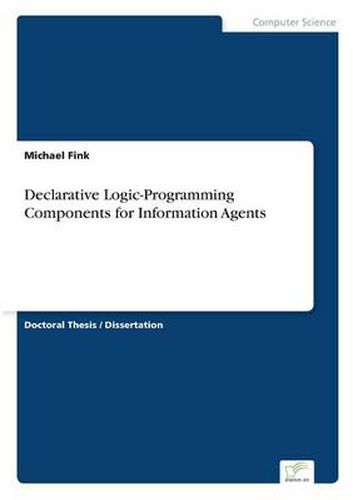Declarative Logic-Programming Components for Information Agents
Michael Fink

Declarative Logic-Programming Components for Information Agents
Michael Fink
This title is printed to order. This book may have been self-published. If so, we cannot guarantee the quality of the content. In the main most books will have gone through the editing process however some may not. We therefore suggest that you be aware of this before ordering this book. If in doubt check either the author or publisher’s details as we are unable to accept any returns unless they are faulty. Please contact us if you have any questions.
Inhaltsangabe: Abstract: At present, the World Wide Web faces several problems regarding the search for specific in formation, arising, on the one hand, from the vast number of information sources available, and, on the other hand, from their intrinsic heterogeneity. A promising approach for solving the complex problems emerging in this context is the use of information agents in a multi-agent environment, which cooperatively solve advanced information-retrieval problems. An intelligent information agent provides advanced capabilities resorting to some form of logical reasoning, based on ad-hoc-knowledge about the task in question and on background knowledge of the domain, suitably represented in a knowledge base. In this thesis, our interest is in the role which some methods from the field of declarative logic programming can play in the realization of reasoning capabilities for intelligent information agents. We consider the task of updating extended logic programs (ELPs), since, in order to ensure adaptivity, an agent’s knowledge base is subject to change. To this end, we develop update agents, which follow a declarative update policy and a reimplemented in the IMPACT agent environment. The proposed update agents adhere to a clear semantics and are able to deal with incomplete or in consistent information in an appropriate way. Furthermore, we introduce a framework for reasoning about evolving knowledgebases, which are represented as ELPs and maintained by an update policy. We describe a formal model which captures various update approaches, and define a logical language for expressing properties of evolving knowledge bases. We further investigate these mantical properties of knowledge states with respect to reasoning. In particular, we describe finitary characterizations of the knowledge evolution, and derive complexity results for our framework. Finally, we consider aparticular problem of information agents, namely information source selection, and develop a
This item is not currently in-stock. It can be ordered online and is expected to ship in 7-14 days
Our stock data is updated periodically, and availability may change throughout the day for in-demand items. Please call the relevant shop for the most current stock information. Prices are subject to change without notice.
Sign in or become a Readings Member to add this title to a wishlist.


